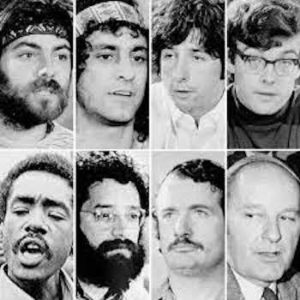
*The Chicago Seven trial is affirmed on this date in 1969. Originally, the Chicago Eight (Conspiracy Eight/Conspiracy Seven) were the defendants, Bobby Seale, Rennie Davis, David Dellinger, John Froines, Tom Hayden, Abbie Hoffman, Jerry Rubin, and Lee Weiner.
The United States federal government charged them with conspiracy, crossing state lines intending to incite a riot, and other charges. Related to anti-Vietnam War and countercultural protests in Chicago, Illinois, during the 1968 Democratic National Convention. The Chicago Eight became the Chicago Seven after the case against co-defendant Bobby Seale was declared a mistrial. He was the co-founder of the Black Panther Party and one of the co-defendants standing trial and was gagged and chained to his chair for refusing to obey Judge Julius Hoffman's contempt citations. Seale originally retained the Black Panthers' lawyer, Charles Garry, as his attorney, and Garry appeared at the defendants' arraignment on April 9.
Shortly before the trial began, Seale and other members of the Black Panther Party were indicted in Connecticut on conspiracy to murder a suspected police informant; because of this indictment, Seale was the only Chicago Eight defendant held in jail during the trial. When the trial started in September, Garry was recovering from surgery and could not travel, but Judge Hoffman refused to delay the start of the trial. The judge also refused to allow Seale to represent himself, in part because Kunstler had signed an appearance for Seale on September 24 to be able to visit him in jail, so Kunstler's request to withdraw as Seale's attorney was an "absolutely discretionary" decision by the judge, and Judge Hoffman decided Kunstler represented Seale.
Seale protested the judge's actions, arguing that they were not only illegal but also racist, telling the court on September 26, "If I am consistently denied this right of legal defense counsel of my choice, who is effective, by the judge of this court, then I can only see the judge as a blatant racist of the United States court." Seale had been in Chicago for less than 24 hours over two days of the convention week, invited shortly before the convention began as a substitute for Eldridge Cleaver. The evidence against him was testimony from undercover police officer Robert Pierson about a speech by Seale in Lincoln Park. According to Pierson, Seale had urged his audience to "barbecue some pork."

Over the defense's objection, Judge Hoffman allowed Pierson to give his opinion that this meant "to burn some pigs," i.e., police officers. On the morning of October 29, after Seale called Judge Hoffman a "rotten racist pig, fascist liar," the judge responded: "Let the record show the tone of Mr. Seale's voice was one of shrieking and pounding on the table and shouting," and Seale replied, "If a witness is on the stand and testifies against me and I stand up and speak out in behalf of my right to have my lawyer and to defend myself, and you deny me that, I have a right to make those requests. I have a right to make those demands on my constitutional rights. I have a constitutional right to speak, and if you try to suppress my constitutional right to speak out on behalf of my constitutional rights, then I can only see you as a bigot, a racist, and a fascist, and I have said before and clearly indicated on the record."
In the afternoon session of October 29, Judge Hoffman ordered Seale to be bound, gagged, and chained to a chair. One juror began weeping when the jury was allowed into the courtroom, and other jurors squirmed hard in their seats at the sight. Seale appeared in court bound and gagged before the jury for three days, struggling to get free and, at times, managing to insist loudly on his right to defend himself. On October 30, in open court, Kunstler declared, "This is no longer a court of order, your Honor; this is a medieval torture chamber." On November 5, the judge declared a mistrial for Seale, and the Chicago Eight became the Chicago Seven, with Seale's case severed for a later trial that never occurred.
All the defendants were charged with and acquitted of conspiracy. Davis, Dellinger, Hayden, Hoffman, and Rubin were charged with and convicted of crossing state lines intending to incite a riot; Froines and Weiner were charged with teaching demonstrators how to construct incendiary devices and acquitted of those charges. All of the convictions were later reversed on appeal. While the jury deliberated, Judge Julius Hoffman convicted the defendants and their attorneys of contempt of court. He sentenced them to jail sentences ranging from less than three months to more than four years. These convictions were later reversed on appeal, and some were retried before a different judge.